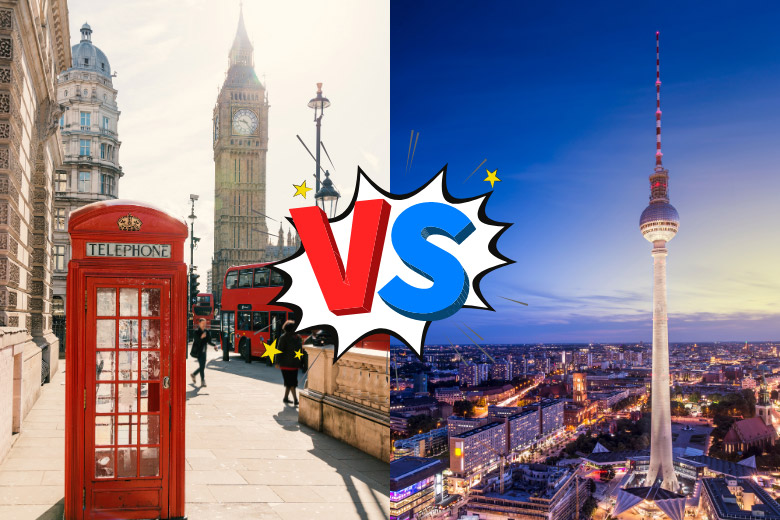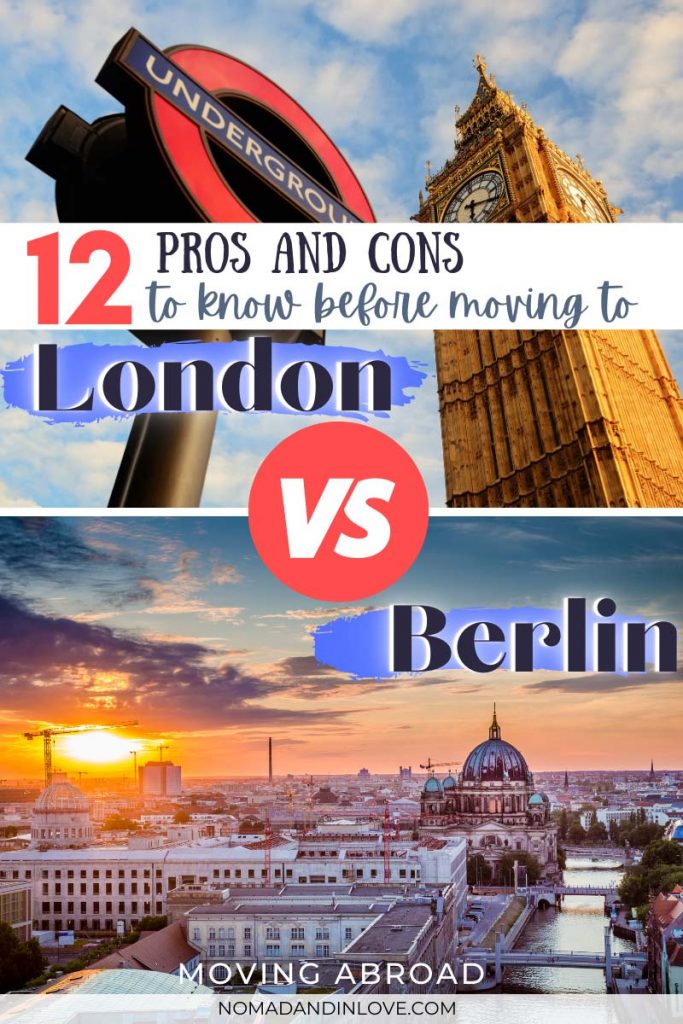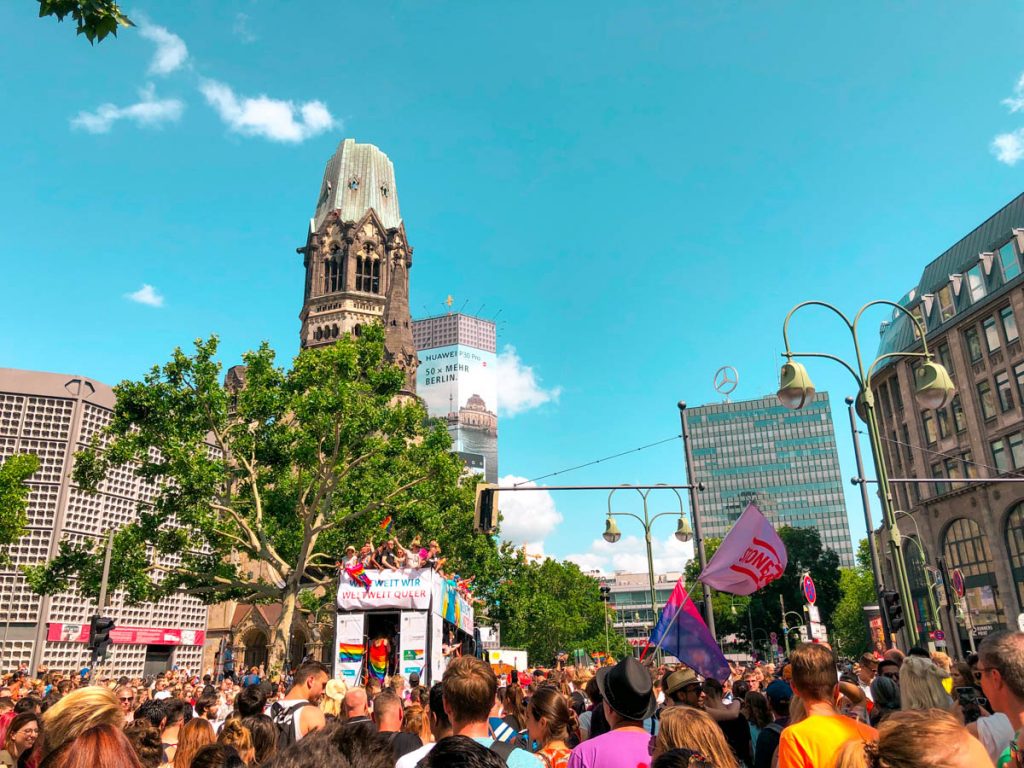
Deciding between living abroad in London vs Berlin? Find out the pros and cons of moving to Berlin vs London from expats!
Living abroad is exciting! But it doesn’t come without its own challenges and one of the first hurdles of moving abroad is deciding where to move abroad to.
And if the saying, ‘so much world, so little time’ resonates with you, you’ll know that this is no easy feat.
So we thought it would be useful to share our personal account on the pros and cons of living in London vs Berlin. We considered both options before making the final decision to move to Berlin.
So if you’re wondering how different life is moving to the capital city of Germany vs the UK, keep reading.
We’re answering some of the most frequently asked questions we get as expats in Germany. Like ‘Is living in Berlin expensive?’, ‘Is Berlin more expensive than London?’, ‘Is Berlin a good place to live?’ and ultimately whether Berlin is better than London.
1. Cost of Living in London vs Berlin

The cost of living is the most obvious, but also one of the most important factors to consider when choosing between moving to Berlin vs London.
It’s a widely known fact that London is one of the most expensive cities to live in. But can the same be said for Berlin? It is the capital city of the largest European economy after all.
Let’s look at some of the largest monthly expenses you’ll need to budget for living in London vs Berlin to answer this question.
Renting an Apartment in London vs Berlin
Whether you’re moving to Germany or the UK, the biggest living cost is renting a house or an apartment.
This is particularly true if you’re planning to move to London, where real estate prices and rental costs are renowned for being one of the highest in the world.
And exactly how much is that, you may ask.
According to fellow expat blogger and our dear friend, Chelsea from ‘The Portable Wife’. You can expect to pay anything between £1,000 to £2,000 per month to rent a one bedroom apartment in London.
Compare that to what an average Londoner earns per month and you can easily wipe out half your monthly salary paying rent alone. And if you want to live close to the city center of London in zone 1, 2, or 3, be prepared to budget up to 70% of your salary for rent!
Yikes? We think the word ‘insane’ may be more appropriate.

Rental prices in Berlin have been increasing rapidly over the last decade. But are still considered fairly reasonable compared to other major cities in Western Europe.
In Berlin, you can expect to pay between €750 to €900 (around £660 to £800) for a one bedroom apartment. That’s about 40% of the average monthly salary you’d earn in Berlin.
Much more reasonable, right? Plus, the chances of living in a larger, more spacious apartment are much higher in Berlin vs London.
| Cost of Rent per Month | London | Berlin |
|---|---|---|
| 1 bedroom apartment | £1,000 to £2,000 | £660 to £800 |
| Flat share with 3 people | Around £400 | Around £300 |
Renting Apartments in Berlin
The much lower rental costs for living in Berlin vs London is a HUGE pro for moving to Germany vs the UK. But with the cheaper rent comes it’s own con: it’s notoriously challenging and stressful finding an apartment to rent in Berlin. We know from personal experience!
The combination of the lack of supply, language barrier, and the huge demand from expats looking to move to Berlin makes the task even harder.

But don’t worry. You can dramatically boost your chances of renting an apartment or flat in Berlin if you’re armed with the right resources, information, and mentality.
Make sure you read our Renting Apartments in Berlin guide if you’re planning to move to Berlin. And if you’re moving elsewhere in Germany, we’ve got 12 tips that will boost your success in renting apartments in Germany.
Related Guide: Apartment scams are rife in any city where housing demand is high. This is true for both Berlin and London. Read our 7 tips to spot and avoid Berlin apartment scams so you don’t get caught out.
Public Transportation Cost
Public transportation is another essential monthly expense to consider when deciding between living in London vs Berlin. And if you’re leaning towards moving to London, it will probably be your second highest living expense.
London is almost twice the size of Berlin, so it makes sense that public transportation costs are also higher. But did you know that the cost of public transport in London is almost 3 TIMES the price of what it costs in Berlin? Eeek!
The cost of public transport depends on which zone you live in of course. So we’ve compared the monthly and yearly public transportation ticket for London vs Berlin using the zones within the city’s main transport ring to make it comparable.
For London that would be zones 1 to 6 and for Berlin, zones A, B and C.
| Public Transport Cost | London (Zone 1 – 6) | Berlin (Zone ABC) |
|---|---|---|
| Monthly Ticket | £253.50 | Around £41.00 |
| Yearly Ticket | £2,640.00 | Around £490.00 |
The Deutschlandticket (49 Euro Ticket) gives you access to unlimited public transport in Germany and only costs £41 (or €49). This is the maximum amount you can expect to pay for a monthly public transportation ticket in Berlin.
Most people in Berlin are able and likely to live within Zones A and B, which is covered by the 49 Euro Ticket bringing your public transport costs to around £41 (or €49) per month. And if you want to bring the cost of getting around even lower, you can also opt for the bike life.
Cycling in London vs Berlin
Both London and Berlin are considered bike-friendly cities. But in our opinion, we feel that this is more true when you’re living in Berlin vs London.
We may be biased as expats who live in Berlin. But for us, a bike-friendly city doesn’t just mean that bicycle lanes exist and that cyclists have priority over cars. Those things are important of course, but what’s also essential is that you are able to get around to most parts of the city within a 30 to 45 minute bicycle ride.
That’s possible when you live in Berlin and it’s actually the preferred mode of transport for getting around in the city.

We’ve permanently switched from taking the train to cycling to get around Berlin and been loving life on two wheels!
Not only does it save you money, but it’s also great for your health, an eco-friendly and sustainable way to travel, and often faster and more convenient than taking public transport. How many more pros do you need than that?
The only con of this: bicycle theft! Oh yes, bike theft is rife in Berlin!
According to the Berliner Zeitung, more than 28,000 bicycles are stolen every year in Berlin. And this is why we use bike sharing in Berlin.
We personally bike share using Swapfiets. It costs us €17.50 a month to rent a high quality, 7-gear bicycle that we can use and keep as if it were our own. And the best part is that we never have to worry about repairs or maintenance, as Swapfiets takes care of it all. Read our Swapfiets review to find out more!
Want to try Swapfiets for yourself? Use this Swapfiets Discount Code and SAVE €7.50 on your Swapfiets subscription (Discount Code: OSAID76140).
If this discount code doesn’t work, let us know and we’ll find you another one.
Related Guide: Never cycled in Germany before? Then read these 24 Bike Road Rules and Traffic Laws for cycling in Berlin and Germany.
Food and Grocery Prices
Food and grocery prices are surprisingly similar whether you’re living in Berlin or London. This is only true if you’re cooking the meals yourself though.
If you do your food shopping at mid-range grocery stores like Sainsbury or Tesco in London, you can expect to spend around £180 per person per month.
This is quite similar to how much we spend on food and groceries in Berlin shopping at our mid-range equivalents (Edeka and Rewe), which is around €200 (£180) per person per month.
If you love visiting cute cafes or dining out, then London is way more expensive. According to Numbeo, it’s around 30% to 40% more expensive to dine out in London vs Berlin.
Something worth noting if you’re a big foodie deciding between moving to Berlin vs London.
Other Monthly Expenses Living in London vs Berlin
Overall, you can expect the cost of living in London to be around £2,300 per person per month vs €1,100 (£980) for Berlin if you rent a one bedroom apartment.
Looking at the cost of living alone, Berlin is the clear winner.

We’ve just compared the biggest and most essential monthly expenses you’ll need to consider before moving to London vs Berlin. There are others of course. But we won’t go through every single expense here because we’ve already written a comprehensive Cost of Living in Berlin guide for that.
And if you’re looking for a detailed Cost of Living in London guide, make sure to check out Chelsea’s blog. It’s incredibly thorough and you’ll find plenty of other useful tips for moving to London and the UK.
Related Guide: The cost of living in Berlin is certainly cheaper than London. But the cost of living in Germany (including Berlin) is rising rapidly. Don’t worry though – there are easy ways you can cut down costs without sacrificing quality of life. Check out our How To Save Money in Germany guide for 14 easy tips to reduce your cost of living.
2. Corporate vs Freelancer Community
Now, this factor may or may not be relevant for you depending on the type of work you do. But if you’re planning to incubate your own start-up or try freelancing instead of working a corporate job, this is an important factor to consider before moving to London vs Berlin.
Ease of Finding a Corporate Job Living in London vs Berlin
There’s no doubt that it’s much easier to find a corporate job in London vs Berlin. This is especially true for English speakers who aren’t fluent in the German language.
Most corporate jobs in Berlin require fluency in both English and German. There are only very few positions where no German is required and it’s usually within the IT, web development, and programming space. Otherwise, it’s pretty challenging trying to find a job in Berlin without strong German language skills.
Moving to Berlin? Get a head start on learning German with these 22 fun and FREE ways to learn the German language online from home.
Start-Ups and Freelancing in London vs Berlin
On the other hand, if you’re planning to launch your own start-up or work as a freelancer, then Berlin will be the better choice than London.
Especially after Brexit and Britain leaves the EU.
The cost of living in London vs Berlin plays a big part of course, but the supportive community and free-thinking mindset are equally as important.

You’ll find a diverse community of freelancers in Berlin. From artists, musicians, videographers to web developers, digital marketers, and bloggers (like us).
We love the fact that living in Berlin allows us to be surrounded by so many like-minded individuals who are finding ways to turn their passion into a career.
Following your dreams and turning them into reality isn’t easy. That’s why it’s so important to be surrounded by others who are doing the same.
Plus, it helps that there are no negative connotations when you say you work as a freelancer in Berlin and don’t follow the social norm of working for a corporate to earn a living.
This is Berlin after all – the city where you can just be you.
And lastly, we love that people living in Berlin and Germany in general, make a conscious effort to support freelancers and other small to medium size businesses rather than your large corporates.
3. Eco-Friendly City: Berlin vs London
If living more sustainably and as eco-friendly as possible is important to you, then you should definitely consider moving to Berlin vs London. Berlin is hands-down, a much more environmentally friendly city than London.
Not only is there a much bigger focus on using less plastic and creating less waste in Germany vs the UK. There are also more pro-green initiatives here.
Initiatives to Reduce Waste and Recycle
One of these eco-friendly initiatives is the deposit (or ‘pfand’ in German) system here in Berlin and the rest of Germany. Consumers are charged an additional deposit amount of €0.25 or €0.50 for each bottled or canned drinks you buy.
This deposit amount is then returned back to you when you bring plastic or glass bottles and canned drinks back to the store.
This ‘pfand’ system also works at German Christmas Markets. All drinks and even some food are served in ceramic mugs or on glass plates. You get charged an additional €2 to €4 as a deposit but get the money back when you return these items.
This significantly reduces the amount of waste produced by single-use items. Awesome, right?

Plus, all households living in Germany are legally required to separate and sort their waste.
This is why Germany has a high recycling rate of 67% for household waste, compared to only 45% in the UK.
Seasonal Produce
Another eco-friendly initiative that you should consider before moving to Berlin vs London, is that supermarkets and grocery stores in Germany tend to sell more seasonal fruits and vegetables.
Although at times it can be annoying to not be able to make your favourite asparagus dish during winter in Germany. We feel that the small sacrifice is worth it if it means that buying more sustainable and seasonal fresh produce will benefit the environment.
Whereas if you were living in London and the UK, you could buy almost any fruit and vegetable regardless of the season.
Convenient, yes – sustainable, no.
4. Ease of Travel
If you’re self-diagnosed travel addicts like we are, then the ease of travel will play a huge factor in whether you decide to live in Berlin vs London.
London may have 5 airports vs Berlin’s lonely 1. But after Brexit when British nationals will no longer enjoy the freedom of movement across Europe, it will probably be much easier to travel and elope on last-minute adventures from Berlin than London.
Especially since Berlin has its own international airport now (finally!). We’ll miss Tegel, but we won’t miss the internal flights we had to take to Helsinki, Frankfurt or Munich to travel abroad.

The same can be said if you’re an avid lover of road trips. Whether you love self-driving trips or traveling by train, you’ll have way more choice when it comes to travel destinations if you’re moving to Berlin vs London.
From London, you can explore the rest of the UK as well as Wales and Scotland by train or by car. But from Berlin, you can effortlessly spend a weekend in Prague or take a 5 hour train to Amsterdam to see the world-famous Dutch windmills in Kinderdijk.
And that’s not even counting the neighbouring countries you can easily pop over and visit from Berlin like Poland, Austria, Switzerland, Denmark, and the Czech Republic.
5. Child and Family-Friendly City
Whether you’re planning to have human or fur babies, Berlin wins vs London in terms of being more family-friendly.
Besides having tons of green space, parks and children’s play areas, Germany also offers better financial and social support than the UK if you plan on having kids (only human kids, unfortunately).
In Berlin and the rest of Germany, both maternity and paternity leave are officially recognized. And each parent can take up to 3 years of parental leave per child until that child reaches the age of 3 years old.
That’s why it’s quite common to see fathers actively involved with raising their children in Berlin.
In comparison, London and the UK only officially approve maternity leave for up to 1 year and paternity leave for 1 to 2 weeks!
Employers in Berlin are also very accommodating in negotiating more flexible work hours than they are in London, whether you have children or not.
And if that wasn’t awesome enough, you’re also entitled to a child benefit or allowance (referred to as ‘Kindergeld’ in German) of up to €204 to €235 per child per month, up until the child reaches the age of 18 in Germany.
This is in comparison to the £84 (or €95) you’ll receive as child benefits per month if you had a child in the UK.
Save Me For Later

6. Commute and Travel Time
We’ve got good news if you hate commuting. The average commute and travel time in Berlin is 30 to 40 minutes to reach the city center (by bike and train). Whereas in London, you could easily spend 60 to 90 minutes commuting to the city center each way!
Now we don’t know about you. But we could put that extra 2 to 3 hours a day to some good use. Whether that be to get some extra sleep or brainstorming ideas for another exciting expat guide!
And if you do opt to drive instead, there are no extra taxes or ‘Congestion Charges’ to be paid if you’re driving in the city centre of Berlin.
We know we’re starting to sound extremely biased towards moving to Berlin vs London, but facts don’t lie.
7. Population Density Living in London vs Berlin
London is almost twice the size of Berlin but with about 3 times the population. Maybe that explains why London has that unique, high-energy buzzing vibe that is often not felt in Berlin.
According to Versus, there’s an average of 5,518 people per square kilometer living in London vs Berlin’s 3,900 people per square kilometer. And that’s if you exclude the horde of tourists that visit London every year!
Add the 30 million tourists that visit London every year and it’s easy to see why London feels crowded.
Berlin, in comparison, attracts around 14 million visitors every year and is the third most visited European destination after London and Paris.

This one’s totally up to your personal preference. We love London’s unique upbeat vibe. But the con is that at times it can cross the line and feel stressful instead.
Berlin, on the other hand, feels way more laid back. The pros are that life feels less stressful and more relaxed in Berlin. But the cons are that it can feel less lively and exciting vs London.
8. The Language Barrier
Our pros and cons for moving to London vs Berlin wouldn’t be complete (or honest) if we didn’t mention the language barrier.
And yes, there will be a language barrier if you’re planning on living in Berlin. It’s a common mistake to believe that Berlin being the cosmopolitan city that it is, that you could easily get by without knowing any German at all.
But after living here for almost 18 months, we can tell you from personal experience that that is not true.
Whether you’re looking for a job, finding an apartment, registering your residential address and getting ‘Anmeldung’ in Germany, or even buying groceries, you’ll need some basic level of the German language to live here.
The language barrier is probably the biggest con you should consider when deciding between moving to London vs Berlin.
We prepared ourselves for our move to Berlin by learning the basics on Duolingo. If you’re curious to know how effective our 4-month Duolingo experiment was. We’ve shared our personal experience on whether Duolingo is good for learning German in another guide.
9. The Weather
Europeans and Brits love to talk about the weather! Now we know why. The summers are short but unforgettable. And the winters… Well, let’s just say that no one ever says they’re moving abroad for the winters in Berlin or London.
So if the weather is one of the deciding factors you’re considering for living in London vs Berlin. Look no further, because they’re pretty similar.
The average difference between the maximum and minimum temperatures between Berlin and London is only around 2 degrees Celcius.
Both cities have warm, amazing summers with long hours of daylight. And winter is the exact opposite. It’s cold, often grey and the sun hides behind a curtain of clouds most of the time.
The only saving grace for Berlin is that the chances of snow are higher in Berlin vs London.

10. Recreation and Things To Do
When it comes to recreation and things to do, you’ll be spoilt for choice whether you live in Berlin or London.
Like the Brits would put it, ‘It all depends on your cup of tea’. So basically it boils down to personal preferences.
Eating and Dining out
For dining out, London is better. It’s more expensive but you get a lot more choice. You can easily satisfy those tastebuds with the diverse and authentic range of cuisines you can find in London.
Dining out in Berlin isn’t bad either. But it’s quite hard to find traditionally spicy dishes if you love Indian, Mexican or Asian food. Most restaurants dial down the heat to suit the German palette.
Museums and Attractions
You’ve probably heard of Berlin’s famous Museum Island if you’re a serious museum lover. But even Berlin’s 175 museums can’t beat the 240 museums you’ll find in London.
And the best part? Most of the museums in London are free to visit, whereas that’s not the case in Berlin.

Luckily, it’s quite affordable to visit any of the museums or tourist attractions in Berlin. The same cannot be said if you want to visit some of the most popular tourist attractions in London.
Theatres and Shows
If you love watching live theatres and shows, then you’ll absolutely love Berlin.
Berlin has 140 theatres compared to London’s 104. No wonder so many artists, musicians and performers are attracted to this vibrant city.

Street Festivals
Both London and Berlin have some of the world’s best street festivals. The type of festivals hosted in each city is quite different, but they do share one in common: Pride Celebration or otherwise known as Christopher Street Day (CSD).
It’s one of our all-time favourite festivals in Berlin and celebrated every year in July.

Another memorable street festival held in Berlin, is The Festival of Lights.
It’s an annual event that takes place every year from September to October where the major landmarks and buildings in Berlin are illuminated in a spectacular show of lights.

Nightlife
London vs Berlin, who wins in terms of nightlife? Well, that’s hard to say. Both cities have awesome nightlife but if you love techno, then Berlin is the city to be.
We have yet to experience our first techno party for ourselves. But we’ve heard that it’s quite common to go clubbing on a Friday and only leave on a Sunday.
We don’t know if we have the stamina for that. But there’s always a ‘späti’ (or late night shop in German) open where you can hang out and meet new people.

11. Cultural Differences Living in London vs Berlin
Both London and Berlin are cosmopolitan cities, but there are some big cultural differences between the two capitals.
The biggest cultural difference (in our opinion, of course) is the ‘live to work’ culture in London vs Berlin’s ‘work to live’ mentality. You can easily feel it by the way people dress and even the pace at which they walk.
It’s not uncommon to see someone enjoying a beer at 10AM on a Monday morning in Berlin. Whereas you’d probably get a lot of stares and even some envious looks if you were to do the same in London.
We don’t blame you Londoners. We would also ‘live to work’ with the eye-watering cost of living in London.
And if you thought Londoners are straight forward and direct, it’s even more so in Berlin. The practice of ‘no small talk’ is actually part of the German culture.
And let’s not forget the other ‘quirks’ of German culture, like how public nudity is natural and normal, their love for hiking and the great outdoors and that family comes before anything else.
Related Guide: Want to know more about German culture? Find out more in our Culture Shock Renting in Germany guide.
12. Quality of Life
We’ve looked at the many pros and cons of living in London vs Berlin and it all boils down to this: it’s much easier to have a higher quality of life living in Berlin than London.
The cost of living is lower, the lifestyle is less stressful and more relaxed and it’s a great city whether you’re single or looking to start a family.
The only hurdle: the language barrier. But once you get that right, you’ll probably love the city as much as we do.
Curious to know more on what’s life like living in Berlin? Read our 21 Living in Berlin Pros and Cons guide to find out whether the city is right for you.
Moving to Berlin, Germany
Planning to move abroad? We’ve written plenty of Moving to Germany guides to help you.
From how you can easily open a German bank account without Anmeldung, to what it’s like to visit Berlin during the coronavirus pandemic.




